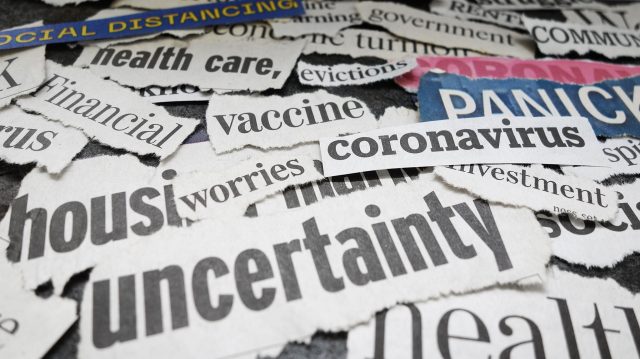
Everyone can arm themselves with good, factual information and take concrete steps to ensure their own mental health and that of people around them during the COVID-19 pandemic. Adobe Stock photo
OXFORD, Miss. – After passing the six-month mark of coronavirus shutdowns, many people are still struggling to find hope and a sense of meaning in their lives. Much about the virus and how to control it remains uncertain; consequently, rates of depression, anxiety, suicidality and substance abuse are increasing.
But even with no end to the crisis in sight, it is still possible to find meaning and hope amidst the chaos, a University of Mississippi psychologist advises.
Psychology professor Stefan Schulenberg is director of the university’s Clinical-Disaster Research Center. An integrated research, teaching and training unit, the center focuses on mental health as it relates to disaster preparedness, mitigation, response and recovery.
Schulenberg directs the UM interdisciplinary minor in disaster sciences, a joint effort across the departments of Psychology, Criminal Justice, Social Work, and Sociology and Anthropology. He also teaches PSY 417: Disasters and Mental Health.
He has written and co-authored more than 80 articles in academic journals and has edited or co-edited five books, most recently “Positive Psychological Approaches to Disasters: Meaning, Resilience and Posttraumatic Growth” (Springer Nature, 2020).
Schulenberg’s research interests include clinical disaster psychology, posttraumatic stress, meaning, resilience and posttraumatic growth. He has studied the effects of Hurricane Katrina and the Deepwater Horizon oil spill, among other events, and is involved with research relating to COVID-19.
As a follow-up to an article written with Schulenberg in March, at the start of the pandemic, he offers advice and insights into navigating uncertainty and finding a sense of meaning during COVID-19:
Q: What issues come up for people when there is a chronic problem, such as the COVID-19 pandemic, with no end in sight?
A: We have never experienced anything like this in our lifetimes. The idea of going through this time unaffected is simply not possible. We are all affected by the pandemic, regardless of how resilient we may be, particularly given its pervasiveness and intensity over time.
Considering the pandemic, concerns of justice and equality relating to law enforcement, and political tensions associated with the election, it feels for many of us that the world is on fire. Even so, our lives continue to unfold and we continue to deal with our own personal stressors on a day-to-day basis.
Even the most resilient person will feel the weight. Even people who are physically healthy become exhausted, and those with strong psychological resilience will feel the effects of chronic stress. With the pandemic, there are concerns about heightened depression rates, anxiety rates, suicidal ideation, substance abuse and instances of domestic violence – a range of things.
People generally are remarkably resilient. This doesn’t mean we won’t need help or that we won’t struggle from time to time. This is especially true now, as there is no break from COVID-19. It’s omnipresent.
We have to find ways to tap into our strengths. It’s so important to recharge our batteries and realize how much energy we are spending just getting through the day. It may be a bit cliché, but I think people have opportunities to show their resilience and character strengths in moments like these. These are opportunities to learn about what is most important to us, what we value the most, what our strengths are and who is truly there for us in our corner.
Trying to turn our present circumstances into a more positive and empowering view helps us remain motivated and keep our feet moving forward.
Q: Do you find that people are coming to terms with COVID and quarantine, or are many still actively resisting it in their emotional and mental lives?
A: My research program in disaster mental health involves a significant “meaning in life” component. Meaning can be defined in a number of ways, one of which is coherence. It is how we make sense of the world around us; some people call it worldview. We all have our worldviews, and a lot of the answer to this question comes down to the flexibility that is involved with people’s worldviews.
If people’s worldviews are rigid, it becomes increasingly difficult for them to take information about the pandemic and make necessary changes. People say things like, “I can’t wait for things to get back to normal,” but – although it may be hard to hear – there will not be a return to “normal.”
The closest example I can draw is to consider 9/11. Just as there is a pre-9/11 and a post-9/11, there is a pre-COVID-19 and there will be a post-COVID-19. We are not through the experience yet, though. We are still dealing with it, and it doesn’t care who we are, where we come from, what our politics are or what we believe in.
The world is evolving, becoming dramatically different from the one we know. We don’t know what this world will look like, and that realization is absolutely frightening for many people.
Some people will be able to shift their worldview to take in and process what has happened and is happening. Some people struggle in the recognition of this shift to a dramatically different world, and some will be so overwhelmed that these events essentially shatter their worldviews.
How one’s worldviews are reconstituted and reorganized relate to such psychological concepts as meaning making, resilience and posttraumatic growth. Some people will become stronger and more resilient, due to their ability to derive meaning from their experiences, their cognitive flexibility and their ability to adjust. This does not mean they are not challenged or stressed; rather, there is some “success” in their search for meaning.
Alternatively, some people will experience a greater disruption to their ability to derive a sense of meaning from their experiences. There may be pronounced difficulties reforming their worldviews. In such instances, we’d expect a greater likelihood of anxiety, depression and so on.
We are trying to respond to extraordinary events. We are not sure where we are going or how long it will take to get there, so there is an active meaning-making struggle. Why did this happen? How did this happen? What does this mean for me? What does this mean for my family? What does this mean for my education/career? When will it be over? Will we be safe? Do we live in a safe world?
We need to be able to make sense of our world and we also need to know that we matter; this is the significance aspect of meaning. We are continuously surrounded by threats to our sense of significance.
How people resolve these struggles, how their worldviews evolve and how they cultivate a sense that they matter will go a long way toward ensuring their mental health. We cannot change things that have happened, but we can change our attitudes toward them. We can change how we move on from here. We can learn to better care for ourselves and for those around us.
Circumstances have placed this demand on us, and we can choose to respond in adaptive fashion and take a stand. We have the ability to develop a sense of meaning in these times and also in terms of the meaning we perceive over time.
Q: What are some of the effects we have seen due to the isolation that comes with working at home?
A: Any problems that were evident before the pandemic are still present and are even magnified by the chronic circumstances that COVID-19 presents. With masks and social distancing, which are absolutely essential to minimize risk, we need to learn new ways to positively cope.
We are social beings and are not used to being isolated, so these times are difficult psychologically for people. It’s a struggle to not be able to go to work or school like we are accustomed to doing, even considering our remarkable ability to adapt. Divorce rates and domestic violence are increasing. There is increased concern over suicidal ideation and substance abuse.
It’s all the more important that we learn how to derive a sense of meaning – this process may take some time – and make sure we are doing things that we value, that we find purposeful. We need to feel like what we do matters.
It is jarring to have such dramatic shifts occur in the context of isolation. Routine is one of the first things we look to restore after a disaster, and with COVID-19, we have had to develop and learn new routines. Isolation puts a lot of pressure on people to evolve.
People are meaning-oriented. We need to find ways to participate in meaningful, values-congruent activities. In other words, we need to do things that are important and purposeful to us and to those around us. We also need to have an understanding of what is going on around us.
These are essential aspects to our worldviews. We either can no longer do many of the things we were used to doing, that make us feel good and find meaning, or we must do them in completely different ways.
Q: As the holidays approach, how may feelings of festivity be affected due to COVID? Also, what advice do you have for people in getting through a festive time in the midst of a health crisis?
A: Even under non-COVID-19 circumstances, holidays are difficult for many people. With the virus, getting through the period from Halloween to Thanksgiving and the winter holidays will not be easy.
We need to think about how to minimize risk for ourselves and our families. In doing so, we may need to revise our traditions or develop entirely new ones. So, the holidays, the things we are used to doing and the people we are used to spending time with, will be different in numerous ways.
We need to focus on the holidays and what they mean to us. We need to do the kinds of things we find meaningful even though they may be very different from what we are used to doing.
One psychological outcome of experiencing a disaster is that it often results in people discovering what really matters to them. It can help them to reprioritize, separate the noise from what they find to be truly important. Disasters are opportunities for meaning making, resilience and, ultimately, growth through adversity.
Q: How do we move forward from where we are now in the pandemic?
A: Finding meaning and giving ourselves a break. We need to be kind to ourselves and to one other. It’s helpful for people to know and understand their strengths and values and to be able to find ways to practice them. See, for example, https://www.viacharacter.org/ for more about the everyday use and science of character strengths.
Recognize what your strengths are and find new ways to use them every day. We need to be thinking about what we can do, even in these circumstances, instead of focusing on the anger and confusion. At some point, we have to come to terms with our circumstances so that we may better learn how to respond to them.
This is the kind of thinking that helps people get up after being knocked down, brush themselves off and get moving forward again.
Above all, follow the science from credible sources. For more information, visit https://cdrc.olemiss.edu/covid-19/responding-and-coping/.
